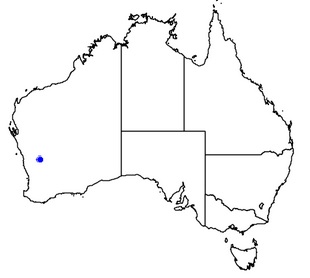Acacia imitans
| center|100x100px | This species is classified RARE. DO NOT harvest this species! |
|---|---|
Contents
General Plant Info
Acacia imitans, known as "Gibson Wattle", is a low, intricately branched, semi-prostrate shrub 0.3-1 m tall by 3 m wide. The branches are grey, smooth and divide into numerous, short, straight and spiny branchlets, often devoid of phyllodes. The phyllodes are asymmetric, small and have a sharp, upturned point. The flowers are yellow and appear from August to September.
Acacia imitans is related to and partially sympatric with Acacia kochii.
Listed as Critically Endangered (Wildlife Conservation Act 1950 (Western Australia): September 2013)
Geographic distribution
Acacia imitans is currently known from 7 populations in the Mount Singleton area approximately 300 km northeast of Perth
The extent of occurrence is estimated to be approximately 20 km2
Beard’s Provinces: Eremaean Province, South-West Province.
IBRA Regions: Avon Wheatbelt, Yalgoo.
IBRA Subregions: Avon Wheatbelt P1, Tallering.
Local Government Areas (LGAs): Yalgoo.
Identification
Phyllodes asymmetric, arcuate-oblong or widely elliptic, with upper margin straight to shallowly concave and lower margin markedly convex, some reflexed, 3.5–7 mm long, 1.5–2.5 mm wide, obtuse, excentrically mucronate with upturned mucro, subglaucous, glabrous; midrib slightly raised; lateral nerves ascending and anastomosing near margins.
Inflorescences simple or sometimes a rudimentary 1-headed raceme inserted with vegetative bud on a common axis <0.5 mm long; peduncles 3–4 mm long, glabrous or antrorsely appressed-puberulous; heads obloid to shortly cylindrical, 6–8 mm long, 4–5 mm diam., presumably golden. Flowers 5-merous; sepals 1/2- 3/4 united. Flowers between August and September.
Pods tightly coiled as in Medicago , to 7 mm long (unexpanded), with valves 3 mm wide, firmly chartaceous, glabrous.
Seeds longitudinal, oblong-elliptic to ovoid, 3 mm long, dull, dark brown; aril minute, subterminal.
Alkaloid content
Other uses
Extraction
Cultivation
Germination trials conducted on seed collections made from Population 3 resulted in a 98.5% average success rate. Trials conducted on the 2001 seed collection made from Population 5 resulted in a 92% success rate. Such a high success rate indicates there are other factors inhibiting natural recruitment, such as grazing of new seedlings, or insufficient germination triggers such as fire or other natural disturbance events.
Suppliers
Dept. of Environment & Conservation-Threatened Flora Seed Centre (DEC-TFSC), Western Australia.
Links
http://www.environment.gov.au/cgi-bin/sprat/public/publicspecies.pl?taxon_id=65211
http://www.environment.gov.au/biodiversity/threatened/species/pubs/65211-listing-advice.pdf
https://florabase.dpaw.wa.gov.au/browse/profile/14118
http://www.worldwidewattle.com/speciesgallery/imitans.php
